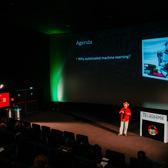Container Orchestration with Kubernetes and Azure
UACON
3 days
Interested in a private company training? Request it here.
Not ready to book yet? Request an offer here.
Containers
Containers provide a lightweight and consistent way to package applications together with their dependencies, enabling them to run reliably across different environments. In this module, you will learn the fundamental concepts behind containers, how they differ from virtual machines, and why container images have become a standard for modern application deployment.
- Containers Overview
- Containers versus Virtual Machines
- Container Fundamentals
- Container Image Layers and Immutability
- Container Runtimes
- Docker Editions
Windows and Linux Containers
Containers can run on both Windows and Linux platforms, each with its own characteristics and requirements. This module explains the differences between Windows and Linux containers and shows how to prepare hosts to run containers in each environment.
- Windows Containers
- Windows Container Isolation Modes
- Linux Containers
- Linux Containers on Windows
- LAB: Windows and Linux Containers
Docker
Docker provides the tooling required to build, run, and manage containers. In this module, you will learn how to create container images, run containers, and manage containerized workloads using Docker and related technologies such as Docker Hub, Docker Compose, and Docker Swarm.
- Docker Overview
- Docker Commands
- Container Networking
- Docker Volumes
- Dockerfile
- Docker Hub
- Docker Compose
- Docker Swarm
- LAB: Docker
Applications in Containers
While this course is not focused on application development, understanding application architecture is essential when working with containers. This module explains how application design has evolved, why microservices are well-suited for containers, and what architectural considerations are important when containerizing existing applications.
- Software Architecture Evolution
- Microservices
- Stateless versus Stateful Applications
- Twelve-Factor App Principles
- Databases and Containers
Kubernetes
Kubernetes is an open-source container orchestration platform used to deploy, scale, and manage containerized applications across multiple hosts. This module introduces Kubernetes architecture, cluster components, and hosting options, with a focus on Azure Kubernetes Service (AKS) and core Kubernetes resources.
- Kubernetes Overview
- Kubernetes Cluster: Control Plane vs Worker Nodes
- Kubernetes API and Declarative Configuration (YAML)
- Cluster Hosting Options
- Azure Kubernetes Service
- Kubernetes Building Blocks: Pods, Volumes
- LAB: Kubernetes
Container Deployment with Kubernetes
Kubernetes provides multiple objects to manage the lifecycle of containerized applications. This module focuses on deploying applications using Deployments, managing updates and scaling, and exposing applications through Kubernetes networking and service abstractions.
- Deployments
- Deployment Rolling Updates
- Scaling and ReplicaSets
- Keda Scalers
- Networking in Kubernetes
- AKS Networking Options
- Services
- LAB: Container Deployment with Kubernetes
Container Management with Kubernetes
Once applications are deployed, Kubernetes offers features to manage access, configuration, security, and observability. This module covers ingress, secrets, namespaces, network policies, and monitoring to help you operate Kubernetes clusters securely and reliably.
- Ingress: Application Routing Add-On, Azure Application Gateway
- Secrets and ConfigMaps
- Use Secrets Stored in Key Vaults
- Namespaces
- Network Policies
- Container Health Monitoring
- Kubernetes Cluster Monitoring
- LAB: Container Management with Kubernetes
Container Technology in Azure
Azure provides multiple managed services for running containerized workloads, ranging from simple container execution to fully managed application platforms. This module compares Azure container services and helps you understand when to use each option based on application requirements and operational complexity.
- Azure Container Registry
- Azure Container Instances
- Web App for Containers
- Azure Container Apps
- Choosing Between Azure Container Instances, Container Apps and AKS
- LAB: Container Technology in Azure
This course teaches IT professionals how to build, deploy, and manage containerized workloads using Docker, Kubernetes, and Azure container services. Participants will learn how to operate containers on Windows and Linux, deploy applications to AKS, and select the appropriate Azure container platform based on workload requirements.
This course is intended for IT professionals who are responsible for deploying and managing containerized workloads in Microsoft Azure. It is suitable for professionals who work with Windows or Linux environments and want to gain practical knowledge of container technologies, Docker, and Kubernetes, including Azure Kubernetes Service (AKS). Basic experience with Azure and general understanding of virtualization, networking, and application hosting concepts are recommended.








